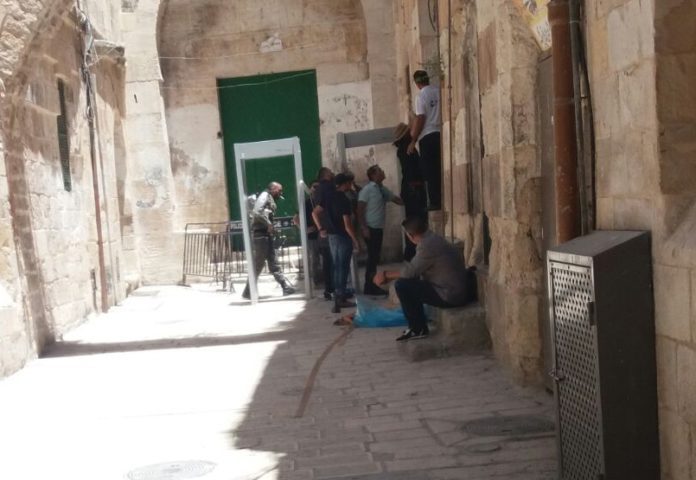Temple Mount Compound Reopens With Tense Standoff Over Security Checks
About 200 people entered the Temple Mount compound for afternoon prayers Sunday after a two-day closure following Friday’s terror attack after installing metal detectors at two entrances to the holy site.
Police said they met with Muslim Waqf officials prior to opening the Mount, but refused to submit to a security check before entering the compound. The officials then led a group prayer service outside the compound.
At the same time, police prevented a small group of Israeli Jews from entering the compound. One person, Temple Mount activist Itamar Sassover, said police told the group they would not be allowed to visit the site following threats by Waqf officials that allowing Jews into the site would lead to riots.
The temporary closure of the Mount also prompted a flurry of anti-Semitic cartoons in Arabic-language media around the Middle East. Saudi-based al-Watan showed a devil-horned Star of David devouring the Dome of the Rock; other outlets around the region in Jordan, Qatar and as far away as London featured images of a bleeding Dome of the Rock, an Israeli soldier locking the gates of the Temple Mount and the Mount barricaded behind yellow crime scene tape emblazoned with Stars of David with a sign reading “No Entry.”
As of this writing, no clashes at the site have been reported. But a Hebrew University professor says the holy site always has the potential to explode into violence.
“You’ve got to understand, Palestinian nationalism was ‘born’ around the issue of the Temple Mount,” said Dr. Hillel Cohen, a senior lecturer in the Dept. of Islam and Middle East Studies. “Even during the proto-nationalist period, during the Ottoman Empire, the Palestinian experience was created mainly around the need to ‘protect’ al-Aqsa Mosque against Western crusaders, and later Jewish colonialists.”
Cohen added that while in other areas of Judea and Samaria Israel has an interest to preserve the status quo, while the Palestinians have an interest to change it, the situation at the Temple Mount is reversed: The Palestinians very much want to preserve the status quo limiting Jewish rights, and some Israeli groups want to change it.
“Of course, it’s hard to predict how anybody is going to act. But it’s clear that the political establishments on either side of the line- the Netanyahu government and Abu Mazen’s cabinet – want to prevent escalation. But on both sides, you’ve got other elements that want to change things, including pro-Temple movements on one side, radical Islamic and nationalist opponents of Abu Mazen on the Palestinian side,” he said.






